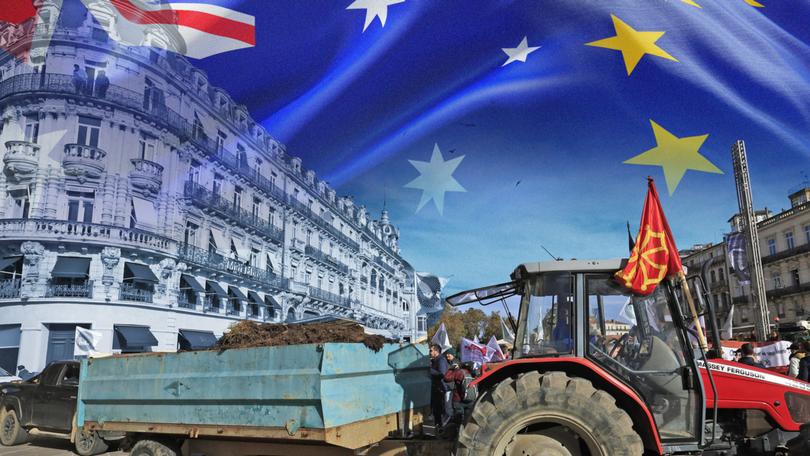Czech Republic President says paying French farmers could secure Australia EU trade deal
The call from the Czech Republic’s Foreign Minister comes with the nation’s President visiting Australia in a geopolitical charm offensive.

The European Union should compensate French farmers to secure a trade deal with Australia, one of its member states has said.
The Czech Republic is trying to boost its bilateral ties with Indo-Pacific countries following the war in Ukraine and has been on a charm offensive with two major visits to Australia this year, including Czech President Petr Pavel’s visit this week.
In an exclusive interview with The Nightly, Czechia’s Foreign Minister Jan Lipavsky said the deal, which fell apart last year, should be revived to help both sides boost their trade with democratic countries amid the geopolitical tensions in both Europe and the Indo-Pacific.
Sign up to The Nightly's newsletters.
Get the first look at the digital newspaper, curated daily stories and breaking headlines delivered to your inbox.
By continuing you agree to our Terms and Privacy Policy.He called on EU Commission President Ursula von der Leyen and the new incoming chief diplomat Kaja Kallas to inject fresh political will into the talks to get a bargain struck with Australia.
“This is my big wish for the next EU Commission,” he said.
“That the words of Ursula von der Leyen — that the EU needs to be more geopolitical and we need to have a more geopolitical commission — will transform from vision to practical reality.”
He said vested interests that derailed the last talks, which were at the final stages before collapsing over a French and Irish-led backlash against allowing more Australian beef into the EU, needed to be put aside - or compensated.
“We need to find a solution to have these treaties and if you have a small group which is blocking it, then you need to be creative,” he said.
“Yes, every treaty will have some winners and losers domestically, but the overall value of those treaties is definitely bigger.
“We should find a political way to solve this issue — maybe we give some extra money to the group, which will — in the short term — not have a profit.
“But to stop them blocking it because overall strategically, this is very important.”
Having only gained independence from Communist rule in 1993, landlocked Czechia is one of Europe’s strongest supporters of Ukraine due to its fears of Russian occupation or the invasion of other formerly occupied Soviet states if Russian President Vladimir Putin triumphs over Kyiv.

As a result, the Czech government has been pouring energy into improving its bilateral relationships with Indo-Pacific countries, stressing that the security challenges faced by both regions are common and global.
In March, Mr Lipavsky became the first Czech foreign minister to visit Australia in 20 years and President Pavel’s visit this week is the first by their President in three decades. Both visits are aimed at improving defence, trade and security ties between the two countries.
But because the Czech Republic joined the European Union in 2004, its trade policy is set by the Commission in Brussels.
Australia-EU trade talks began in 2018, before both Prime Minister Anthony Albanese and President Von der Leyen took office.
Agriculture and geographical indicators have always been sticking points and were the ultimate barrier when the negotiations collapsed last year.
But immediately after becoming Prime Minister in 2022, Mr Albanese blamed the Coalition and former prime minister Scott Morrison’s policies for preventing a breakthrough.
Mr Albanese said that it was the former government’s positions on climate change and the breakdown in the bilateral relationship with France over AUKUS that had stalled progress on clinching a deal.
“It was clear that there were two impediments,” Mr Albanese said in June 2022 on a visit to Spain.
“One was the Australian relationship with France and the breakdown that had occurred in recent times, given France’s leadership role in Europe.
“And the second was Australia’s position on climate change, where the perception by Europe and ,indeed by the world, was that Australia was a handbrake on global action on climate change was clearly hindering our capacity to enter into economic relationships with our European friends.”

But despite making much of Australia’s improved relationship with France under the Labor government, the Prime Minister has proven no more successful than his predecessor in swaying its President Emmanuel Macron in Australia’s favour.
It was Macron’s government that demanded the European Commission – which negotiates trade deals on behalf of the 27-member nation bloc – refuse to allow Australia’s request to export tens of thousands of tonnes of tariff-free beef into Europe.
The opposition’s foreign spokesman Simon Birmingham said Mr Albanese did not do enough to get the deal over the final hurdle and went missing in action.
“I remain very disappointed that the Australia-EU trade agreement negotiations went off the rails,” he told the Latika Takes podcast during his visit to Prague earlier this year.
“Whilst the going off the rails may not have been his fault or even Australia’s fault, the fact there was no effort at the leader’s level to pick the phone up, was a missed opportunity and a lack of leadership.
“The FTA matters because it’s about … diversification … and how, now in this contested world liberal market economies come together to make each other as strong as possible.
“And the idea that Australia and the European Union still have antiquated trade barriers and restrictions on investment flows, is completely counter to the type of shared economic strength that we should both be seeking to build, that can then better support us to be resilient in other ways, including in the investment of defence deterrence.
“This is about ensuring that democratic market economies are backing each other in.”

